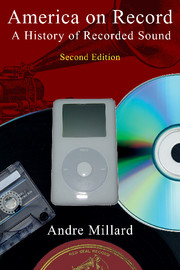Book contents
- Frontmatter
- Dedication
- Contents
- Preface to the second edition
- Preface to the first edition
- Introduction
- Part One The acoustic era
- Part Two The electrical era
- Part Three The digital era
- 16 The media conglomerates
- 17 Into the digital era
- 18 Consolidation and connectivity in the digital era
- Abbreviations used in the notes
- Notes
- Select discography
- Select bibliography
- Subject index
- Recordings index
- Motion picture index
16 - The media conglomerates
from Part Three - The digital era
Published online by Cambridge University Press: 05 February 2015
- Frontmatter
- Dedication
- Contents
- Preface to the second edition
- Preface to the first edition
- Introduction
- Part One The acoustic era
- Part Two The electrical era
- Part Three The digital era
- 16 The media conglomerates
- 17 Into the digital era
- 18 Consolidation and connectivity in the digital era
- Abbreviations used in the notes
- Notes
- Select discography
- Select bibliography
- Subject index
- Recordings index
- Motion picture index
Summary
The company that developed the tape cassette was a multinational electrical manufacturer. The Philips corporation of Holland began by manufacturing Edison's incandescent bulbs and became one of the largest electronics concerns in Europe. It made a variety of electrical equipment including televisions, radios, tape recorders, and home stereos. It developed elements of the cassette technology with the Theo Staar engineering concern of Belgium and worked closely with large Japanese electrical manufacturers such as Sony and Matsushita in designing cassette players. Philips also owned the PolyGram record group, which provided software for its players.
Philips was a large, diversified group of companies, a conglomerate, with interests in both the machines and the music they played. With their varied interests in numerous lines of business, and their strong commitment to research and development, the media conglomerates were ideally positioned to exploit new trends in entertainment and technology.
The merger movement which created media conglomerates began in the 1960s and in many ways reflected the consolidations of the 1930s, when large corporations bought out smaller companies. Instead of depression, profit was the cause of the takeover trend of the 1960s. The total record sales of $6 million in 1960 doubled to $1.2 billion by the end of the decade, making the record business a highly profitable undertaking.
This dramatic increase in sales was basically the result of a change in format for popular records. The 45-rpm single had always been the format for rock'n'roll, but the Beatles changed this with LPs such as “Sgt. Pepper.” This was a landmark recording not only because it made rock more acceptable to adults; it moved rock from the 45- to 33-rpm format. The baby boomers were growing up, and the concept album or “rock opera” replaced the 45-rpm single in their record collections. At $4.98 a unit, compared with the 98$ single, the popular-music LP was the foundation of the huge volume of sales in the late 1960s and 1970s – the maturing baby boom audience was purchasing LPs instead of singles.
- Type
- Chapter
- Information
- America on RecordA History of Recorded Sound, pp. 331 - 345Publisher: Cambridge University PressPrint publication year: 2005



